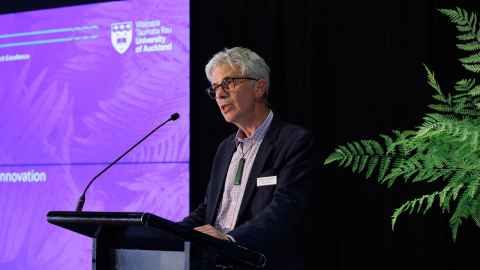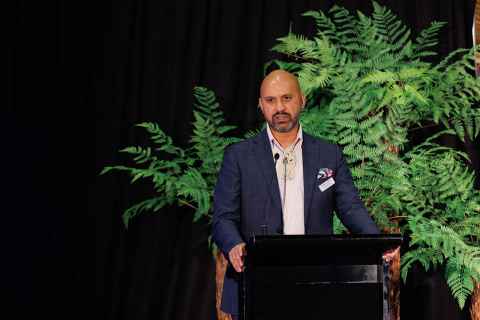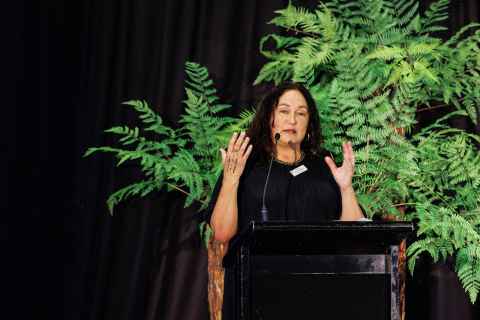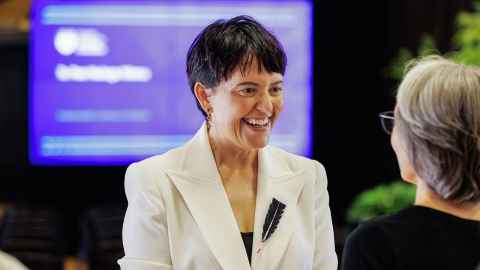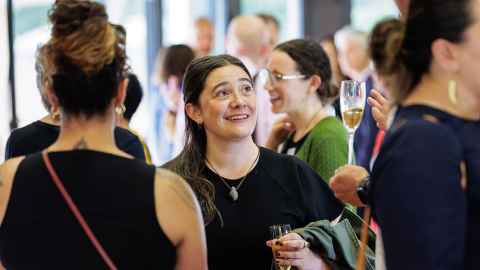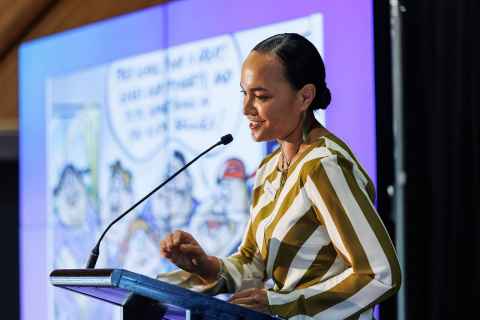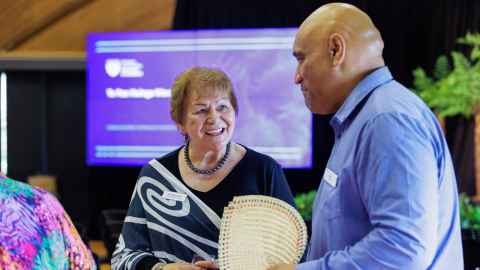Te Pae Huinga Manu celebrates Indigenous research excellence
28 November 2025
The inaugural Te Pae Huinga Manu event showcased Māori-led research excellence, a key research strength at Waipapa Taumata Rau, University of Auckland.
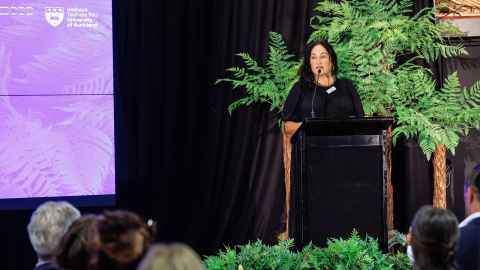
A senior Aotearoa science leader posed three key questions for the audience at Te Pae Huinga Manu, the University of Auckland’s inaugural celebration of Māori-led research and leadership, held on 27 November.
Dr Willy-John Martin, the director of Māori Science, Innovation and Technology at the Ministry of Business, Innovation and Employment (MBIE), said his role offered a bird’s eye view of the research landscape. His job was to support the translation of Māori research excellence towards a thriving Aotearoa New Zealand.
He asked: “What really matters for our communities and for Aotearoa in the coming decade and how will research contribute to solutions? The second question is, of all the Mātauranga, what is truly transformational and what transformation are we seeking?
“And what skills and capabilities do we need to build now, not just the ones we have, but additional skills so that we can prepare our mokopuna for the future?
In celebrating you, we also acknowledge your partners, your whānau, your parents, your kaumatua, your iwi, your colleagues and your friends who support you to be the wonderful people you are.
Pro-Vice Chancellor Māori Professor Te Kawehau Hoskins, acknowledged the support for Māori-led research at Waipapa Taumata Rau, University of Auckland, built on the legacy and mana of Māori researchers from the University who had passed.
She said an analysis of the University’s research had identified one of its key strengths as Indigenous research, across many disciplines. Over a five year period to 2024, research from University Māori academics had been cited by 141 policy bodies across 26 countries.
“This was music to our ears,” Hoskins said “We're doing work that is holistic, transdisciplinary, and achieving impact and transformation in our communities.”
At the start of the Te Pae Huinga Manu, Kaiarataki Michael Steedman and Geremy Hema, Poutiaki Rangahau Māori of the Pro-Vice Chancellor, Māori Office, acknowledged the legacy of Māori research excellence at Waipapa Taumata Rau, shaped by visionary scholars whose work transformed Aotearoa’s academic and policy landscape. These included the late Professor Ranginui Walker and Dr Moana Jackson, as well as Professor Linda Tuhiwai Smith, Professor Margaret Mutu and Professor Bruce Biggs. Professor Mutu attended the event.
Fittingly, Dame Rangimarie Naida Glavish, the trailblazer whose courageous stand for te reo Māori and lifelong advocacy for health equity and cultural integrity, was in the audience.
Hoskins said the showcase demonstrated the richness and excellence of Māori-led research. She acknowledged the mahi of each of the guest speakers.
“In celebrating you, we also acknowledge your partners, your whānau, your parents, your kaumatua, your iwi, your colleagues and your friends who support you to be the wonderful people you are.”
SPEAKERS
The inaugural Te Pae Huinga Manu showcase featured four speakers: Professor Deidre Brown (Faculty of Engineering and Design) a 2025 Ockham Book Award winner (with Professor Ngarino Ellis) for Toi Te Mana: An Indigenous History of Māori Art (Auckland University Press), which also recently won Best Book at the prestigious Apollo Awards. The book was a groundbreaking exploration of Māori artistic traditions, tracing cultural, spiritual and political significance from ancestral origins to contemporary practice.
Professor Sarah-Jane Paine (Faculty of Medical and Health Sciences) University of Auckland Research Impact Award winner 2025; research director of New Zealand’s biggest longitudinal study, Growing Up in New Zealand. Her work advances Māori health, health equity and life-course research informed by whānau ora principles.
Dr Jamie-Lee Rahiri (General Practice and Primary Healthcare, Faculty of Medical and Health Sciences) Early Career Research Excellence Award winner 2024 and L’Oréal–UNESCO Science Award winner 2025. Leads Māori-centred surgical research and champions equity in clinical practice.
Dr Ngahuia Harrison (Fine Arts, James Henare Research Centre, Faculty of Arts and Education) Vice-Chancellor’s Prize for Best Doctoral Thesis 2024. Her creative-led photographic research explores Indigenous relationships with place and memory.
Note: Two of the speakers scheduled to appear, Associate Professor Dan Hikuroa and Professor Ngarino Ellis, could not attend due to illness.
Media contact
Te Rina Ruka-Triponel | Kaitohutohu Pāpāho Māori
E: te.rina.triponel@auckland.ac.nz
